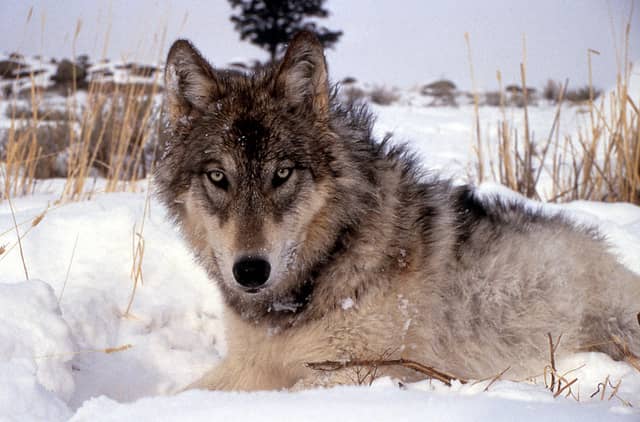Wolf Removed From Endangered Species List in Western Great Lakes
Agnieszka Spieszny 01.27.12

The wolf continues to bounce back after it was hunted nearly to extinction by the early 20th century. This week, the United States Fish and Wildlife Service removed the wolf from the federal endangered list and put wolf-management control back in the hands of three Great Lakes states, Michigan, Wisconsin and Minnesota.
Now, it is up to the individual states to decide how to manage the population including hunting laws, lethal control in regards to livestock, personal property and other laws. USFWS reminds Great Lakes residents that each state has its own laws concerning wolves and those living on the border of two states, especially those in the Upper Peninsula in Michigan and north Wisconsin, should seek proper information regarding their state.
More information on your state’s laws on wolves can be found on your state’s Natural Resources or Fish and Game Department. Click for Michigan DNR Wolves, Wisconsin DNR Wolves, and Minnesota DNR Wolves.
Original press release issued by Michigan DNR on January 27th, 2012.
Management authority over wolves in Michigan has been officially returned to the Department of Natural Resources, putting the state’s Wolf Management Plan into effect, the DNR announced today.
The U.S. Fish and Wildlife Service’s decision to remove wolves in the western Great Lakes region from the federal endangered species list became official today. The Great Lakes region includes Michigan, Wisconsin and Minnesota. Wolves remain a protected, nongame species in Michigan, but state management will afford more options when dealing with wolves preying on livestock or dogs.
“Delisting is a victory for the state and for Michigan citizens who have been affected by this issue,” said DNR Director Rodney Stokes. “The state’s healthy wolf population is a reminder that Michigan still has places where wild animals such as wolves can live and thrive. Fully implementing the state’s Wolf Management Plan will allow us to more effectively respond to problem wolves, while maintaining a self-sustaining wolf population and increasing social acceptance of the species as a whole.”
The DNR will continue to recommend nonlethal methods of control as the first option for residents. However, in cases where nonlethal methods are not working or are not feasible, state officials will now have greater flexibility to use lethal means to remove problem wolves when appropriate. In addition, Michigan residents will be able to legally protect their livestock and dogs if an animal is being attacked by a wolf.
The Michigan Legislature passed laws in 2008 to allow livestock or dog owners, or their designated agents, to remove, capture, or, if deemed necessary, use lethal means to destroy a wolf that is “in the act of preying upon” (attempting to kill or injure) the owner’s livestock or dog(s). These state laws took effect Jan. 27, 2012.
Livestock or dog owners who use lethal means to destroy a wolf must observe the following guidelines:
- Report the lethal take of a wolf by calling the Report All Poaching (RAP) hotline at 800-292-7800 no later than 12 hours after the lethal take.
- Retain possession of the wolf until a DNR official is available to take possession. A DNR official will respond to the scene within 12 hours of notification.
- Do not move or disturb the dead wolf. The only exception to this rule is if a wolf has been killed in the act of preying upon livestock and leaving the wolf in place would impede normal farming practices. In that case the wolf may be moved to a secure location once photographs are taken of the wolf and the area where lethal means were used.
“Although lethal control methods are now legal in certain circumstances, wolves remain a protected species in Michigan and no hunting or trapping season is in place,” said DNR Law Enforcement Division Chief Gary Hagler. “The DNR will investigate and continue prosecution of any wolf poaching cases.”
Illegally killing a wolf is punishable by up to 90 days in jail, a $1,000 fine, or both, and the cost of prosecution. Suspected poaching violations may be reported 24 hours a day, seven days a week to the DNR’s RAP hotline at 800-292-7800.
There are an estimated 687 wolves in Michigan’s Upper Peninsula. For more information on Michigan’s wolf population, greater detail about the two laws governing wolf depredation, and to see the state’s Wolf Management Plan, visit www.michigan.gov/wolves.
The Michigan Department of Natural Resources is committed to the conservation, protection, management, use and enjoyment of the state’s natural and cultural resources for current and future generations. For more information, go to www.michigan.gov/dnr.

